- New eBook additions
- Available now
- Most popular
- Popular "Always Available" eBooks - No Wait!
- Read It Before You See It
- Homeschooling Resources
- Colorado Authors Spotlight
- Business Essentials
- Spanish-Language Books
- See all ebooks collections
- New audiobook additions
- Available now
- Always Available FICTION Audiobooks
- Always Available NONFICTION Audiobooks
- Audiobooks Under 3 Hours Long
- Most Popular Audio Between 3 and 5 Hours Long
- Most Popular Audio Between 5 and 10 Hours Long
- Radio Dramatizations/Adaptations
- Audiobooks for the Whole Family
- Great Narrators
- Spanish-Language Books
- See all audiobooks collections
- 100 Most Popular Magazines!
- Art & Architecture
- Business & Finance
- Celebrity
- Cooking & Food
- Fashion
- Home & Garden
- Kids & Teens
- News & Politics
- Science
- Sports
- Travel & Outdoor
- See all magazines collections

